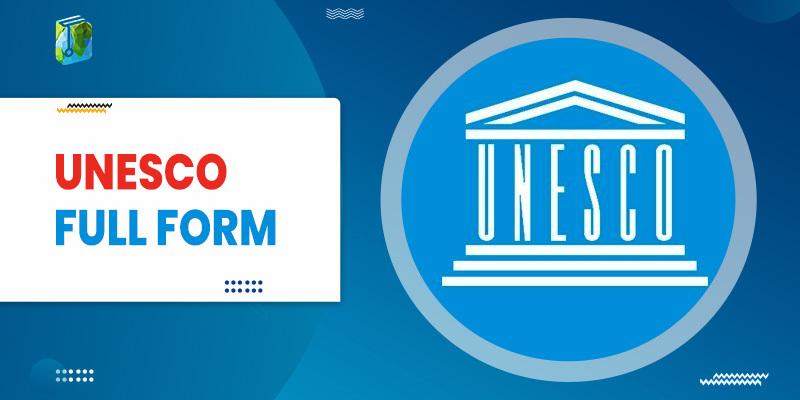UNESCO Full Form
UNESCO’s full form is the United Nations Educational, Scientific, and Cultural Organization. It is a specialized agency of the United Nations that seeks to build peace in men’s and women’s minds through global cooperation in education, the sciences, and culture. UNESCO was formed in 1945 with its headquarters in Paris, France. Audrey Azoulay is the Director-General of the organization. At present, the organization has 193 members and 11 associate members under its network.
UNESCO works towards making the life of an individual peaceful, with intellectuality and humanity as its main ingredients. To accomplish this mission, UNESCO develops educational tools, promotes cultural heritage and the equal dignity of all cultures, and fosters scientific programs and policies.
UNESCO accomplishes its mission by working on the following areas-
- Education- UNESCO works towards educational development, starting from the initial stage of schooling, by promoting global citizenship and sustainable development, human rights and gender equality, health and HIV and AIDS, and technical and vocational skills development. It carries on its missions through various events and programs conducted globally, primarily in poor nations.
- Culture- To protect our heritage and foster creativity, UNESCO prioritizes cultural development by encouraging the international community to set unambiguous policies and legal frameworks. It also supports governments and local stakeholders in safeguarding their heritage, strengthening local creative industries, and promoting cultural diversity.
- Natural Sciences– UNESCO assists countries in funding science, technology, and innovation (STI) by developing national science policies, reforming their science systems, and building capacity to measure performance through STI indicators and statistics. UNESCO is treading the path of fostering the use of science and technology, particularly in bioethics.
- Social and Human Sciences– UNESCO, along with its member countries and partners, tends to address the challenges of a more diversified society by implementing its programs such as Management of Social Transformations (MOST), its Youth Programme, and the Culture of Peace and Non-Violence Programme, which include, inter alia, initiatives for democracy and global citizenship, intercultural dialogue, peace-building, by promoting the development and practice of sporting activities, as well as the fight against doping. UNESCO assists the Member States in enacting sound and reasoned policies on ethical issues in science and technology by creating linkages among global ethicists, scientists, policy-makers, judges, journalists, and civil society.
- Communication & Information– The activities of UNESCO covered under this domain are fostering freedom of expression, media development, the safety of journalists, universal access to information and knowledge, and the development and application of artificial intelligence respectful of human rights and ethical principles.
The United Nations Educational, Scientific, and Cultural Organization, or UNESCO, has also taken the initiative to focus on developing ocean science for the well-being of the marine ecosystem in order to combat climate change and preserve biodiversity.
Lists of resources under the purview of UNESCO-
- World Heritage
- Intangible cultural heritage
- Creative cities
- Biosphere reserve
- UNESCO Global Geoparks
- UNESCO Atlas of the World’s Languages in Danger
- UNESCO Institute for Statistics
- Transparency portal
- Observatory for Killed journalists
- World Inequality Database on Education.
UNESCO Developments
- UNESCO coordinates Tsunami early warning systems all over the world
- UNESCO led to the reconstruction of the Mausoleums in Timbuktu
- UNESCO established the SESAME world-class research laboratory in the Middle-East
- UNESCO’s programs seek to achieve the Sustainable Development Goals defined in Agenda 2030, adopted by the UN General Assembly in 2015.
- UNESCO’s programs contribute to achieving the Sustainable Development Goals defined in Agenda 2030, adopted by the UN General Assembly in 2015.
Conclusion
Today, UNESCO’s programs are organized around five major themes: 1) education; 2) natural sciences; 3) social and human sciences; 4) culture; and 5) communication and information. UNESCO is also actively working to achieve the United Nations’ Millennium Development Goals, but it focuses on significantly reducing extreme poverty in developing countries, developing a program for universal primary education in all countries, eliminating gender inequalities in primary and secondary education, promoting sustainable development, and reducing environmental resource loss.

